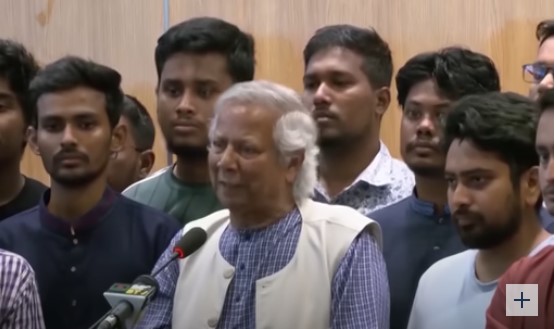Newsman: The founder of the Grameen Bank Nobel Peace laureate Muhammad Yunus took charge of Bangaladesh’s caretaker government on Thursday amid anarchy that was canvased by weeks of violence, forcing Prime Minister Sheikh Hasina to quit and left the country.
“The brutal, autocratic regime is gone,” Yunus said in a televised address to the nation after taking charge. “Tomorrow, with the rising sun, democracy, justice, human rights, and full freedom of fearless expression will be enjoyed by all, regardless of party affiliation. That is our goal.”
Earlier on Thursday, on his arrival in Dhaka following medical treatment in Paris, Yunus said he would govern it with the guidance of students who backed him for the role in the caretaker government.
President Mohammed Shahabuddin administered the oath of office to Yunus and 13 advisers who will help him govern, at a brief ceremony in the official presidential residence.
Nahid Islam and Asif Mahmud, two student leaders also sworn and joined the caretaker government, who are both in their mid-20s and led the protests,.
Hasina’s Awami League party does not figure in the interim government.
The army played a critical role towards the end of the crisis, conveying to Hasina that troops would not open fire on civilians to enforce a curfew declared on Sunday.
Muhammed Yunuis was indicted in June by a Bangladesh special court in an embezzlement case of over $2 million. Yunus denied the charges and says the case was politically motivated by the former prime minister, who saw him as a potential rival.
He was released on bail and had traveled to Paris for the Olympic Games. Muhammad Yunus called on Bangladeshis to “make the best use of our new victory” from Paris prior to leaving for returning to Bangladesh.
Bangladesh police announced an indefinite nationwide strike on Tuesday, fearing for their safety. The students are also demanding deep-seated reforms to prevent future governments from abusing the powers.
On the other hand, many Hindu homes, temples and businesses were vandalised after Hasina’s departure, and hundreds in the minority community have tried unsuccessfully to flee to India this week. The Bangladesh Hindu Buddhist Christian Unity Council said a schoolteacher was killed and 45 other people hurt.
Majority Hindus have traditionally supported Hasina’s Awami League party, which identifies as secular.
The student-led movement that ousted Hasina grew out of protests against quotas in government jobs that spiraled in July, provoking a violent crackdown that drew global criticism, though the government denied using excessive force.
Typically in Bangladesh, an interim government rules for 90 days, and its job is to pave the way for elections. With Hasina’s party crushed for now, her chief rivals, the BNP, are eager for elections that they would almost certainly win.
Many Bangladeshis were proud of how Hasina transformed the country, building roads and railways, and developing a large garment export industry. But her party could not resolve high youth unemployment and corruptions in the system.

